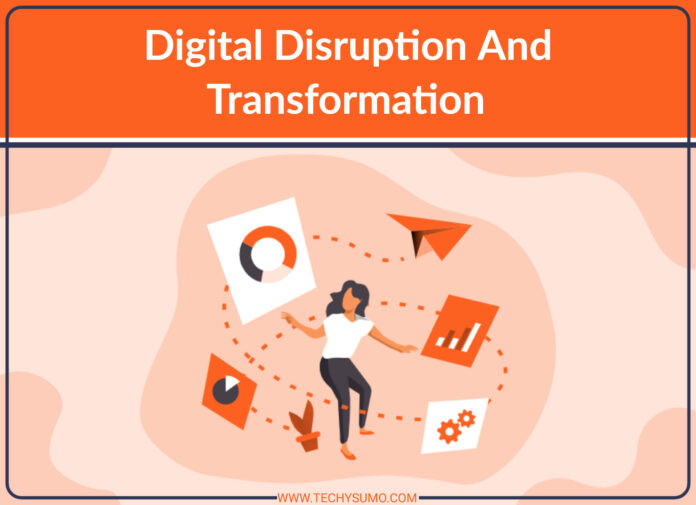“Today’s the fastest growing companies did not get where they are by using the same business models as their competitors or incrementally using the same tried and true practices. Instead, they change the game with technology. They adopted the new trends, pioneered new digital models, and offered products and services that differentiated with insight. And they did so ahead in the competition.”
This quote from Forrester defines the importance of disruption in digital transformation. Because without disruption, innovation doesn’t exist.
Digital transformation is an insistent buzz in the ears of the managers everywhere, virtually in every industry, even the most unexpected. In the context of digital transformation, disruption is a change in the business, as usual, leading to a better place than we were before. It is like implementing something new for the betterment of customers, employees, and stakeholders. It is committing to be different and to disrupt the industry with something great.
Table of Contents
How to become a digital disruptor?

To be truly innovative and disruptive, it is a must for your business to look past the technologies that will keep them relevant. Instead, focus on the big picture.
With that in mind, this article details the best digital disruption and strategies for digital transformation that can help you to achieve the business’ full digital potential.
Align on why digital transformation
Often leaders believe that digital transformation leads with the technology and the why behind the implementation is only discussed afterward. But this is a backward approach and often get failed.
To see digital transformation up for success, it is crucial to start with identifying your business goals and needs and build a strategy with time. A great way to start with this is to make a strategic goal for your organization- like your next 5-10 years plan for the future. Create a foundation for digital transformation and defined business value.
Prepare for culture change
It’s not the technology at the heart of digital transformation, it’s humans. It’s natural for there to be resistance to change and skepticism of the new so be prepared to address that push back. Always keep in mind that any transformation will have changes along the way; leaders need to nurture a culture where everyone learns from their mistakes and builds upon success.
As digital transformation initiatives roll out, it will surely affect the employees’ daily work. Identifying projects that truly improve the efficiency, effectiveness, as well as productivity of your workers, is a critical part of the digital transformation.
Make small,but strategic plans
Proving ROI in a short frame time gives you a digital transformation momentum. Some projects could have a sizeable ROI but could take a year to implement. The best starting initiatives are quick wins that can be up and running and give you good measurable results within 6 months or less.
Layout technology implementation

A successful business transformation does not start with the technology, but it starts with the strategy. For a successful business digital transformation, technology is a necessary tool that can help you to reach the desired and defined business outcomes. A common set of these technologies include Mobile, IoT, Robotics, Digital twin, Cloud, Artificial Intelligence & machine learning, augmented reality, and additive manufacturing.
One or more of these technologies may be necessary to achieve your initial transformation. It may be that some of them are already being used in your organization, but there are missing pieces that are preventing real business value from being comprehended.
Developing a real road map in sync with these advanced technologies is an essential step for digital transformation success.
Seek out partners and expertise
When looking for technology and technology partners, always keep in mind the future vision. There are a few questions you should ask:
- Will the technology and vendor support scaling?
- Do the vendor and team share a similar vision for digital transformation?
- How does it incorporate with your current technology?
- Will they be able to support the same technology?
- What results they have achieved to date with similar use cases and with similar companies?
Sometimes, you may have the most perfect technology but not the right partner who can help you to implement it. Partners with expertise have lessons from their past clients and projects. They know what to do and what not and that is very crucial to execute a successful transformation strategy.
Seek out the right partners who complement your strength and understand your business. They can help your team deliver the right disruption, faster and more seamlessly than going it alone. This ensures that the right actions are in place to make your innovation successful and add value to your users.
Get feedback and improve as needed

Now when you have a vision, a brand-based coalition, a roadmap, and partners in digital transformation success, it’s time to define the KPI for each project. Knowing that digital transformation is a journey means to check in with the process, adjust and improve.
There are chances that new technologies may come, but your technologies should be flexible and agile to treat and respond accordingly. A strategic roadmap is essential but being capable to improve according to the results is the ultimate path to success.
Scale and transform
By now when your organization has started to see the results, leverage this success to gain momentum and generate collaboration around the next steps, as well as create new strategies. Look out for opportunities to scale horizontally and vertically by applying the same techniques and strategies to multiple locations.
The digital transformation looks different for each firm, and that is what makes the digital transformation so important for any organization.
The final thoughts
One of the biggest misconceptions about digital transformation is it’s a destination- once we achieve what we want, we move into something else. As industry and business evolve- digital transformation is also evolved. It will be continued to be a critical part of your business strategy to remain competitive, differentiate the business, and drive high efficiency.
Now that you know what digital disruption is, why it is important, and how you can achieve this with digital transformation strategies, it’s very important to not lose sight of your customers.


























